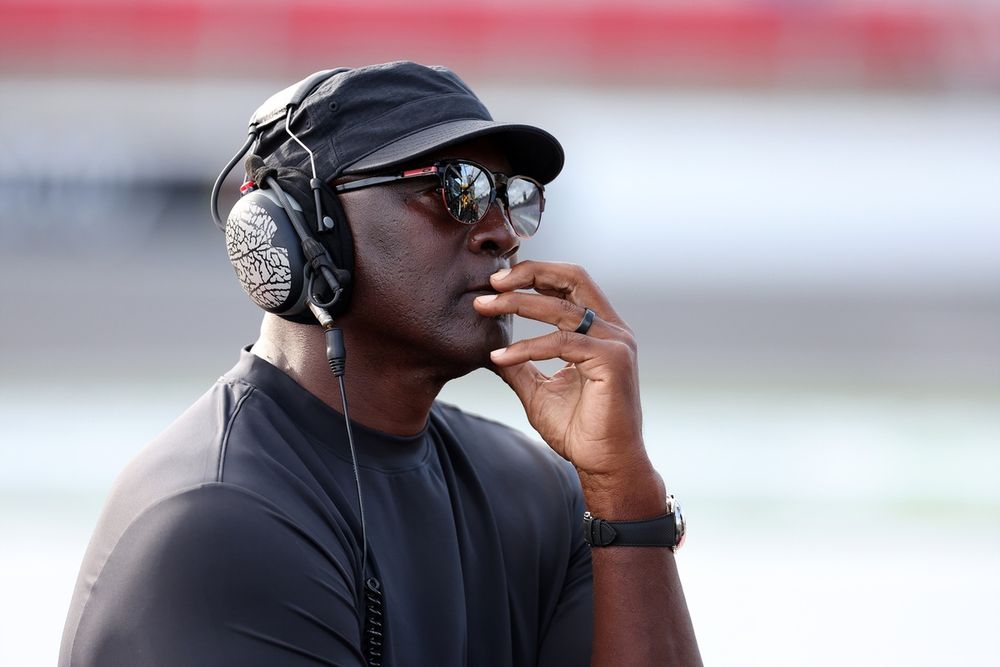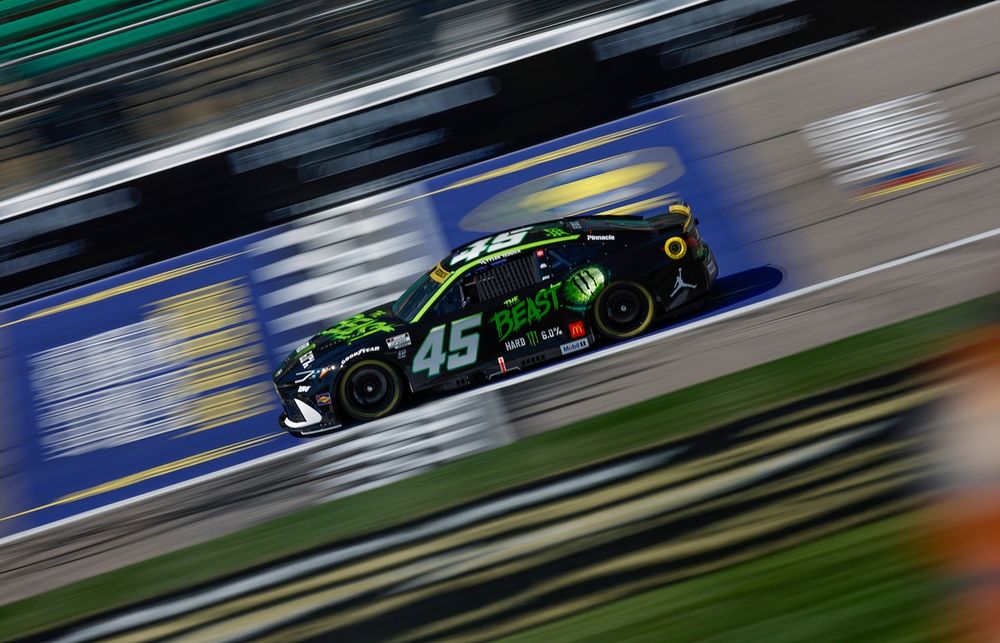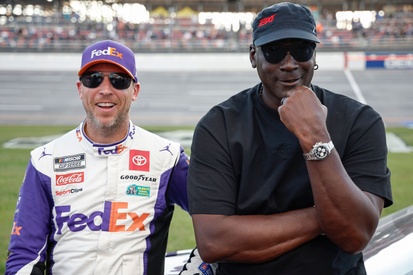NASCAR, 23XI and Front Row debate summary judgement in court

Things could always change, of course, but it seems as though the 23XI Racing and Front Row Motorsports v NASCAR antitrust lawsuit and countersuit is destined for a trial by jury come December.
The two parties met in court on Thursday following two days of settlement mediation overseen by Judge Kenneth D. Bell. The judge, who has overseen this case for over a year now opened this session by thanking the legal representatives and their clients for trying to reach an agreement — even if not immediately fruitful.
“Everyone acted in good faith to settle this case,” said Judge Bell.
With no settlement in place after Tuesday and Wednesday, the parties moved on towards summary judgment motions that each side filed over the past month — a process that needs to at least be considered by Bell before a trial can begin.
Summary judgement is a pretrial decision where there are no disputes of material fact. In other words, a judge could rule on the merits, based on evidence presented by both sides, and without a jury.
However, Judge Bell has also expressed a reluctance to issue summary judgment as to not taint the jury come December but the process played itself out regardless on Thursday morning.
The specific matters addressed in court on Thursday were as follows:
- NASCAR’s motion to have Judge Bell effectively toss out 23XI and FRM’s claims on a lack of evidence and because any behavior falls under a statute of limitations
- The team’s motion asking for summary judgment to dismiss allegations that 23XI investor Curtis Polk embarked on a strategy to threaten, coerce, and extort NASCAR into meeting their demands for better contract and financial terms” over the charter agreement extension negotiations
- Summary judgements on what is the relevant market and whom had market authority to impose terms on the other party

23XI Racing logo
Photo by: Adam Davis – Icon Sportswire – Getty Images
Starting with Polk, NASCAR’s legal position has continued to be that the longtime business partner of Michael Jordan — who collectively own 23XI Racing alongside Cup Series veteran Denny Hamlin — attempted to coordinate an illegal collective bargaining process with his fellow team owners while negotiating charter extension terms.
NASCAR has painted Polk, the Race Team Alliance (RTA) and Team Negotiating Committee (TNC) as a ‘cartel’ that conspired to illegally increase revenue for chartered organizations. The legal argument is that all the race teams are ‘horizontal competitors’ and thus cannot collectively bargain.
The position made by NASCAR previously is that teams cannot agree what to pay their drivers, crew chiefs or crew members — much less be in a position to bargain with the Sanctioning Body collectively.
Nevertheless, the position of 23XI and Front Row has been that Polk, as leader of the TNC, never forced other team owners to refuse individual negotiations with NASCAR. In fact, NASCAR ultimately reached charter extension agreements with every team except those which eventually brought litigation.

Michael Jordan, 23XI Racing
Photo by: Jordan Bank / Getty Images
In court on Thursday, NASCAR produced newly publicized evidence from discovery to make its point that there was a cartel conspiracy to force NASCAR to reach unfavorable terms with the teams.
This included a text message thread in which Polk said the following about his end goal concerning negotiations with NASCAR:
“(Jim France) will realize WE are united, WE are organized, WE have a plan and he will see that without giving us something meaningful, the lack of harmony will harm him eventually.”
In a text message to Joe Gibbs Racing president Dave Alpern:
“I thought the goal is to show (not say this directly) you can have all the one-on-one meetings you want. These 16 teams are together and they want the Charter renewal process addressed in a certain way …”
NASCAR also produced a hand-written note from Polk to himself:
“We need to stick together (and) not get picked off one by one … we can provide talking points … No decisions will be made (without) coming back to this group.”
In a November 17, 2022 text message, Polk told Jordan they needed to ‘educate’ smaller teams on why taking certain deals wouldn’t work for the entire collective. This was in reference to Petty GMS Racing, Kaulig Racing, Front Row, Wood Brothers Racing, Spire Motorsports, Rick Ware Racing, JTG Daugherty and Live Fast Motorsports.
“NASCAR has been going to the smaller teams and saying they offered (REDACTED) million per team which on its surface sounds great to these teams. So we need to educate them as to why that would never been accepted by ALL the teams (because) it’s not equally distributed and would not change where we are much in 2025 …”
There were also text messages from August 30, 2022 where Polk said, ‘I got all 16 owners to vote for our recommended approach (even Penske)’ and ‘I strongly told (Rick Hendrick) how damaging that would be to the process because it would embolden Jim France to think he could go around the negotiating committee and get his way.’
The point of this text was to illustrate that Polk had convincing sway over the other team owners, or in the words of NASCAR, was the leader of a cartel conspiracy.
The alleged conspiracy centered around Polk convincing other team owners to boycott the regularly occurring Team Owner’s Committee meeting with NASCAR on April 5 2023.
As Hamlin said in a text to Sport Business Journal reporter Adam Stern:
“We aren’t notifying them that we aren’t coming. Just not showing up. Very upset with the lack of movement and if anything, talks went backwards. Refusing to meet with them until Jim (France) or Lesa (France Kennedy) meet with negotiating committee to explain their position.”

Tyler Reddick, 23XI Racing Toyota
Photo by: Sean Gardner / Getty Images
With all of this said, Judge Bell routinely pushed back on the idea that this represents anti-competitive behavior or an illegal conspiracy on two fronts:
- NASCAR was never prevented from negotiating with teams individually, and reached deals with 13 of them as a result
- NASCAR had routinely negotiated jointly with all the teams since the first charter agreement that was ratified in 2016, all through the RTA
Jeffrey Kessler, the attorney representing 23XI and FRM, said that Polk merely suggesting that the teams should stick together isn’t a conspiracy but rather a negotiating tactic supported by legal precedence. Representing NASCAR, lead attorney Christopher Yates also cited precedence that he believed support the illegality of it.
Judge Bell also pushed back on NASCAR in saying its goal should not be to prove that the tactic ‘damaged NASCAR’ but rather, ‘damaged competition.’ It’s not illegal for one side to earn better terms but it is a violation of antitrust law to ‘harm competition’ in a market.
The judge also asked NASCAR’s representation what it would look like if teams did not negotiate collectively in some fashion.
“That would be a nightmare, wouldn’t it,” Bell asked.
Bell’s point was that every team that signed the charter agreement, signed the exact same terms, and that it would be a logistical struggle to ask every single team approve a line-item adjustment.
And yet, NASCAR said that did happen with a smaller team asking for a change and then NASCAR going to every other team to approve that line-item swap.
Judge Bell then suggested that was a point for the teams’ argument that NASCAR was not prevented from negotiating on an individual basis.
“So that’s indicative that individual meetings were utilized. NASCAR was not restrained.”
Again, Judge Bell has indicated that he wouldn’t rule on summary judgment as to not taint the jury but he also objectively pushed back quite a bit on NASCAR legal’s arguments on Thursday morning.
NASCAR’s legal team did not provide proof or documentation of how competition was harmed but instead said it could prove it at trial. The response from the teams was that this is a summary judgement hearing and that NASCAR needed to provide such testimony or affidavits in this setting to be awarded summary judgement.
“It’s either in the record or it’s not,” Kessler said during his rebuttal period. He also said this is NASCAR’s burden of proof.
Bell said he would accept a filing from NASCAR on these matters after the hearing.
On market authority

Zane Smith, Front Row Motorsports Ford
Photo by: Logan Riely / Getty Images
Also under argument on Thursday were various volleys about the defined market and who has authority in said market.
For example, is the market ‘premier stock car racing’ or is premier stock car racing part of a broader market that also includes IMSA, IndyCar and Formula 1. For much of the past month, 23XI and Front Row have argued the former and NASCAR has argued the latter.
Kessler said that during sworn testimony that Steve Phelps and Lesa France-Kennedy could not identify another purchaser of premier stock car racing teams and that NASCAR’s experts could not either.
“There is no question that there is a 100 percent market share and it is durable,” Kessler said.
NASCAR’s expert testimony argued that race teams could go compete in the Xfinity Series or Truck Series, or more broadly, IndyCar or Formula 1. Kessler rejected that notion regarding 23XI and Front Row.
“All of their investments are for stock cars,” Kessler said. “Their people and equipment are for stock cars. None of that is usable in Indy or F1.”
NASCAR’s argument as pointed towards the likes of Chip Ganassi and Roger Penske, who have owned cars and people within both divisions. Kessler said that owning a car wash, and then buying the diner next door to it, doesn’t make the diner and car wash businesses synonymous.
“Our clients are not in the racing business,” Kessler said. “Michael Jordan, if you point a gun to his head and say ‘you have to go to IndyCar,’ you better have a big gun. He doesn’t want to be in Indy. He wants to be in NASCAR.”
Yates said Kessler’s argument is all built around a ‘false premise’ because there is movement from NASCAR and IndyCar, be it drivers, engineers or personnel. He said that Chip Ganassi selling his NASCAR operation to Trackhouse Racing and then expanding his IndyCar and INDY NXT operations shows ‘substitution and movement.’
In other words, it’s the same market in his legal opinion.
To wit, Yates said that NASCAR, IndyCar, F1 and CARS Tour are all within the same market but that competition is what drives them to be different.
Judge Bell, in an exchange that elicited laughter from the room, asked if hot tea and hot coffee were in the same market. Bell said he liked hot coffee but would never be caught drinking hot tea.
Yates said they were both in the ‘beverage’ market.
Judge Bell then asked if IndyCar and F1 fall within the same market as NASCAR, then why does NASCAR exclude open when racing when crafting non-compete exclusions.
“NASCAR doesn’t want someone copying its identity,” Yates said.
Judge Bell said there are some people who own both a NFL and NBA team but doesn’t believe having the same owner makes those two sports within the same market.
Yates said that dirt track racing could be defined as ‘premier stock car racing.’
Ultimately, NASCAR’s position as illustrated by Yates was that it cannot be a monopsony, where there is only one buyer for services that imposes less than competitive terms, because the teams received revenue increases from the 2016 charter agreement to the 2025 charter agreement.
Kessler’s rebuttal is that the increases barely keep up with inflation and that point is misleading.
In a final quip, Judge Bell said he didn’t want a response to either party to this line about the market but offered it anyway.
“When I go to ESPN.com, the tab reads ‘NFL,’ ‘MLB,’ ‘NCAA,’ ‘NHL,’ ‘NBA,’ ‘NASCAR,’ ‘IndyCar,’ and ‘F1.’ Maybe they need an economist.”
This was a response to both parties having opposing expert economists reaching two different conclusions on what the market is — either ‘premier stock car racing’ or ‘motorsports.’
Statute of limitations

NASCAR President Steve Phelps
Photo by: Chris Graythen – Getty Images
The two parties also argued over how any time-barred actions or a statue of limitations apply.
NASCAR says any action prior to 2021 is time barred and therefore not admissible for damages or legal scrutiny. This includes alleged anticompetitive behavior like NASCAR formally acquiring the ARCA Racing Series or merging with sister track owning company International Speedway Corporation.
The two teams are arguing that alleged anticompetitive damage is ongoing, and thus the clock is continually reset, as NASCAR imposed non-compete covenants, NextGen car agreements, track exclusivity agreements, charter transfer agreements and the lawsuit release clause are still actionable.
What is next?
Before recessing for the day, Judge Bell made clear a loose timeline of his expectation for remaining items that need to be addressed prior to the trial scheduled to begin on December 1.
This trial could last two weeks or more.
Bell also intends to put out a ruling, if he deems necessary, within the next two weeks. He could choose to rule on all of the motions, a partial judgement, or none of them.
The judge has constantly referred to this case as both parties ‘burning the house down over everyone’s head,’ and that he considers himself a fire marshal in urging both sides to consider a settlement.
To wit, Bell said he was preparing to put out whatever figurative fire comes as a result of the trial.
“I’m trying to figure out how big the fire hose should be,” said the Judge.
Bell also indicated that he does not intend to use a chess clock during the trial. He wants to give both parties time to lay out their case in December. He says, ‘I feel pretty confident in my ability to control counsel.’
In other words, while a settlement at any time before or during the trial is still possible, especially after summary judgement decisions define the parameters of a lawsuit, the process is now heading towards a trial-by-jury in just under six weeks.
We want your opinion!
What would you like to see on Motorsport.com?
– The Motorsport.com Team





